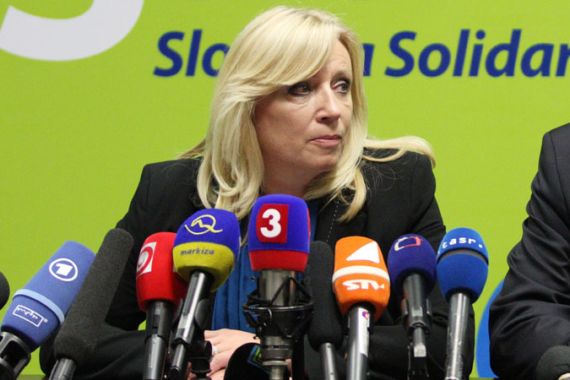Eurozone bailout hinges on shaky Slovak vote
Slovakia’s prime minister, facing opposition, has reportedly offered to resign to ensure “yes vote” on 440bn-euro fund.

 |
| Radicova says she will put her government’s future on the line before the vote on the temporary bailout fund [EPA] |
The Slovak prime minister, Iveta Radicova, has staked the future of her coalition government on a parliamentary vote to approve the European Union’s new, temporary bailout fund.
After Malta approved the European Financial Stability Facility (EFSF) late on Monday, Slovakia became the last of the 17 member states to decide. All other members have approved the measures.
But doubts remain about the outcome of the Slovak vote, since Radicova’s four-party cabinet has been unable to reach a compromise deal over enduring objections from one junior party.
The SITA news agency said on Monday that Radicova had offered to tie the EFSF vote to a confidence vote on her cabinet, resign if the fund does not make it, or resign before the vote.
“By the morning, I will take a responsible decision on further steps that I’ll propose to the coalition partners,” Radicova said when leaving the last round of inconclusive talks late on Monday.
|
Changes to the EFSF include: Giving the EFSF more power to inject capital into banks. Increasing the lending capacity to $600bn. Buying bonds of distressed governments. |
Three of the four parties in the right-of-centre government want to push through the mechanism, which is aimed at preventing the Greece debt crisis from spiralling out of control.
But a fourth, the liberal Freedom and Solidarity (SaS) party, has threatened to vote against it, arguing that one of the poorest members in the Euro zone should not have to pay for the huge debts racked up by richer states like Greece or Italy.
Under the agreement, Slovakia would have to provide guarantees worth 7.7bn euros ($10.2bn). The SaS also wants an opt-out provision from the European Stabilisation Mechanism, a permanent bailout fund designed to replace the EFSF in 2013.
The vote on Tuesday may fail, but the parliament can put the ratification to repeated ballot within hours or days after that once a political agreement with the opposition is in place.
Radicova, whose coalition commands 79 votes in the 150-member parliament, depends on the SaS’s 22 seats in the vote scheduled for Tuesday afternoon.
Failing their support, she would have to rely on the opposition left powerhouse Smer-SD, but ex-prime minister Robert Fico, who leads the party, has made his backing conditional on a power shift in the coalition government or a snap election.
Any further delay to the ratification of the EFSF expansion, which was originally envisioned to happen by mid-October, could rattle markets already under pressure from signs that the crisis is already spilling beyond Greece’s borders.
The EFSF was set up in May 2010 to save Greece from default, and eurozone leaders agreed in July to boost its powers to stem the debt crisis threatening the whole euro project.
The German chancellor, Angela Merkel, and the French president, Nicolas Sarkozy, said after talks late on Sunday that they would unveil new measures in the coming weeks to solve the debt crisis, but gave few details.